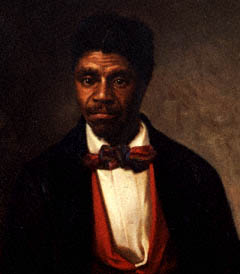Dred Scott
|
|
Dred Scott (ca. 1799 - September 17, 1858) was a slave who sued unsuccessfully for his freedom in the famous lawsuit Dred Scott v. Sandford which bears his name. His case was based on the fact that he and his wife Harriet had once lived, while slaves, in states and territories where slavery was illegal, including Illinois and parts of the Louisiana Purchase. The court ruled 7 to 2 against Scott, stating that slaves were property, and the court could not deprive people of their property without due process of law according to the Fifth Amendment. This case was one of the major factors leading to the American Civil War.
Life of Dred Scott
Dred Scott was born in Virginia in 1799 as property of the Peter Blow family. Dred Scott and the Blow family moved to St. Louis in 1830, but due to financial problems the Blow family had to sell Scott to Dr. John Emerson, who was a doctor for the United States Army. Dr. Emerson traveled extensively into Illinois and the Wisconsin territories where the Missouri Compromise prohibited slavery. It was during these travels that Scott met and married his wife, Harriet Robinson, and Dr. Emerson met and married his wife, Irene Sanford. The Scotts and the Emersons returned to Missouri in 1842. Dr. Emerson died in 1843. John F.A. Sanford, Mrs. Emerson's brother, would become executor of the estate. When he born he was just called "Sam"
Scott filed his case in 1846 and first went to trial in 1847 in a state St. Louis courthouse. The Blow family financed his legal defense. They lost the initial trial; however, due to hearsay evidence were granted a second trial by the presiding Judge. Three years later in 1850 a jury decided the Scotts should be freed under the Missouri doctrine 'once free, always free.' Mrs. Emerson, at this point a widow, appealed, and only two years later the Missouri Supreme court struck down the lower court's ruling saying, "times now are not as they were when the previous decisions on this subject were made." The Scotts were returned to their masters as chattel once more.
The Scotts sued again in the St. Louis federal court with the aid of new lawyers. The Scotts lost their case in federal court and appealed to the Supreme Court. In 1857 Chief Justice Roger B. Taney delivered the majority opinion which stated Dred Scott had no claim to freedom, that slaves are property and not citizens and thus cannot bring suit against anyone in federal court and that because slaves are private property the federal government cannot revoke a person's right to own one based upon where they live, thus nullifying the essence of the Missouri Compromise. He also argued that Scott was a slave and private property and was thus protected by the Fifth Amendment, which says that property cannot be taken away without "due process".
Some years after the case, Scott was returned to his original owners, the Blows, who granted him his freedom less than a year and a half before his death from tuberculosis in 1858.
Dred Scott is interred in Calvary Cemetery, St. Louis, Missouri.
External link
- A biography from the Missouri state government (http://www.sos.mo.gov/archives/resources/africanamerican/scott/scott.asp)
- Full text of the Dred Scott v. Sandford Supreme Court decision from Findlaw (http://caselaw.lp.findlaw.com/scripts/getcase.pl?court=US&vol=60&invol=393)

